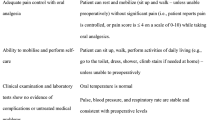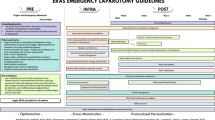Abstract
Background
Despite the emergence of Enhanced Recovery Protocols (ERPs) in cardiac surgery, there is no consensus on the essential elements for data reporting for quality improvement efforts, as well as accountability and standardization of outcome reporting across institutions. The aim of this study was to establish a consensus on essential data elements for cardiac ERAS®.
Methods
A 2-round modified Delphi technique was utilized based on existing recommendations from the recently published ERAS® cardiac surgery consensus guidelines. Round 1 included a steering committee of 10 experts who oversaw formulation of a focused list of data elements into 3 main areas: Preoperative, intraoperative and postoperative. Round 2 consisted of a multidisciplinary, multinational, heterogenous group of 50 voting experts from across the United States and Europe. All participants evaluated their level of agreement with each data element using a 5-point Likert scale with consensus threshold of 70%.
Results
In round 1, 17 data elements were considered essential (consensus > = 70%, either positive or negative) and 6 were considered marginal (consensus < = 70%, either positive or negative). In round 2, positive consensus was achieved for 15/17 (88.2%) data elements in the essential category, and all six data elements (100%) in the marginal category, indicating a high level of overall agreement.
Conclusion
This initial study, which identified 21 key data elements for collection in an ERAS® cardiac program, will aid clinicians in establishing a framework for evaluating the quality of their contemporary ERP processes and will allow acquisition of data to help benchmark performance metrics between hospitals.


Similar content being viewed by others
References
Cui H, Sun Z, Ruan J, Yu Y, Fan C (2019) Effect of enhanced recovery after surgery (ERAS) pathway on the postoperative outcomes of elbow arthrolysis: A randomized controlled trial. Int J Surg 68:78–84
Medbery RL, Fernandez FG, Khullar OV (2019) ERAS and patient reported outcomes in thoracic surgery: a review of current data. J Thorac Dis 11(Suppl 7):S976–S986
Scarlet S, Isaak RS, McGinigle KL (2018) Design and Implementation of an Enhanced Recovery after Surgery (ERAS) Pathway for Major Limb Amputation in Vascular Surgery. Am Surg 84(4):e147–e149
Liu F, Wang W, Wang C, Peng X (2018) Enhanced recovery after surgery (ERAS) programs for esophagectomy protocol for a systematic review and meta-analysis. Medicine (Baltimore) 97(8):e0016
Williams JB, McConnell G, Allender JE et al (2019) One-year results from the first US-based enhanced recovery after cardiac surgery (ERAS Cardiac) program. J Thorac Cardiovasc Surg 157(5):1881–1888
Hillman RT, Sanchez-Migallon A, Meyer LA et al (2019) Patient characteristics and opioid use prior to discharge after open gynecologic surgery in an enhanced recovery after surgery (ERAS) program. Gynecol Oncol 153(3):604–609
Engelman DT, Ben Ali W, Williams JB et al (2019) Guidelines for Perioperative Care in Cardiac Surgery: Enhanced Recovery After Surgery Society Recommendations. JAMA Surg 154(8):755–766
Grant MC, Isada T, Ruzankin P, et al. Results from an enhanced recovery program for cardiac surgery. J Thorac Cardiovasc Surg. 2020;159(4):1393–1402 e1397.
Dalkey N, Helmer O (1963) An experimental application of the Delphi method to the use of experts. Manag Sci 9(3):458–467
Moher D, Liberati A, Tetzlaff J, Altman DG, Group P (2010) Preferred reporting items for systematic reviews and meta-analyses: the PRISMA statement. Int J Surg 8(5):336–341
Bakaeen FG, Svensson LG, Mitchell JD, Keshavjee S, Patterson GA, Weisel RD (2017) The American Association for Thoracic Surgery/Society of Thoracic Surgeons position statement on developing clinical practice documents. J Thorac Cardiovasc Surg 153(4):999–1005
Graham R, Mancher M, Miller Wolman D, Greenfield S, Steinberg E, eds. Institute of Medicine (US) Committee on Standards for Developing Trustworthy Clinical Practice Guidelines: Clinical Practice Guidelines We Can Trust. Washington, DC. US: National Academies Press; 2011. ISBN-13: 978–0–309–16422–1
Aloi TL, Camporese G, Izzo M, Kontothanassis D, Santoliquido A (2019) Refining diagnosis and management of chronic venous disease: Outcomes of a modified Delphi consensus process. Eur J Intern Med 65:78–85
Tarola CL, Hirji S, Yule SJ, et al. Cognitive Support to Promote Shared Mental Models during Safety-Critical Situations in Cardiac Surgery (Late Breaking Report). 2018 IEEE Conf Cogn Comput Asp Situat Manag CogSIMA (2018). 2018;2018:165–167.
Fleming IO, Garratt C, Guha R et al (2016) Aggregation of Marginal Gains in Cardiac Surgery: Feasibility of a Perioperative Care Bundle for Enhanced Recovery in Cardiac Surgical Patients. J Cardiothorac Vasc Anesth 30(3):665–670
Shah RM, Hirji SA, Percy E, et al. Cardiac Surgery in Patients with Opioid Use Disorder: An Analysis of 1.7 Million Surgeries. Ann Thorac Surg. 2020;Apr;109(4):1194–1201.
Orhurhu V, Olusunmade M, Urits I et al (2019) Trends of Opioid Use Disorder Among Hospitalized Patients With Chronic Pain. Pain Pract 19(6):656–663
Engelman DT, Crisafi C, Germain M, et al. Utilizing Urinary Biomarkers to Reduce Acute Kidney Injury Following Cardiac Surgery. J Thorac Cardiovasc Surg. 2019. Oct 17;S0022–5223(19)32245–7.
Balzer F, von Heymann C, Boyle EM, Wernecke KD, Grubitzsch H, Sander M. Impact of retained blood requiring reintervention on outcomes after cardiac surgery. J Thorac Cardiovasc Surg. 2016;152(2):595–601 e594.
Campbell SM, Braspenning J, Hutchinson A, Marshall M (2002) Research methods used in developing and applying quality indicators in primary care. Qual Saf Health Care 11(4):358–364
Funding
None.
Author information
Authors and Affiliations
Corresponding author
Ethics declarations
Conflict of interest
Dr Boyle reports personal fees from ClearFlow Medical during the conduct of the study and is a founder of and has a patent to ClearFlow Medical pending and issued. Dr R. Engelman is a consultant for Cryolife. Dr D. Engelman reported personal fees from Astute Medical, Edwards Lifescience, and Zimmer-Biomet outside the submitted work. Dr Arora has received honoraria from Mallinckrodt Pharmaceuticals and an unrestricted education Grant from Pfizer Canada. There are no other conflicts of interest to disclose.
Disclosures
Dr. Sameer Hirji reports and is a member of the Cardiac ERAS Society. Dr. Rawn Salenger reports and is a member of the Cardiac ERAS Society. Dr. Edward Boyle reports personal fees from ClearFlow Medical, outside the submitted work; In addition, Dr. Boyle has a patent ClearFlow Medical issued and is a member of the Cardiac ERAS Society. Dr. Judson Williams reports and is a member of the Cardiac ERAS Society. Dr. V. Seenu Reddy reports and is a member of the Cardiac ERAS Society. Dr. Michael Grant reports and is a member of the Cardiac ERAS Society. Dr.Subhasis Chatterjee reports and is a member of the Cardiac ERAS Society. Dr. Alexander Gregory reports and is a member of the Cardiac ERAS Society. Dr. Rakesh Arora reports other from Mallinckrodt Pharmaceuticals, grants from Pfizer Canada, outside the submitted work and is a member of the Cardiac ERAS Society. Dr. Daniel Engelman reports personal fees and other from Cryolife, personal fees from Astute Medical, personal fees from Edwards Lifescience, personal fees from Zimmer-Biomet, outside the submitted work and is a member of the Cardiac ERAS Society.
Additional information
Publisher's Note
Springer Nature remains neutral with regard to jurisdictional claims in published maps and institutional affiliations.
Supplementary Information
Below is the link to the electronic supplementary material.
Rights and permissions
About this article
Cite this article
Hirji, S.A., Salenger, R., Boyle, E.M. et al. Expert Consensus of Data Elements for Collection for Enhanced Recovery After Cardiac Surgery. World J Surg 45, 917–925 (2021). https://doi.org/10.1007/s00268-021-05964-1
Accepted:
Published:
Issue Date:
DOI: https://doi.org/10.1007/s00268-021-05964-1




